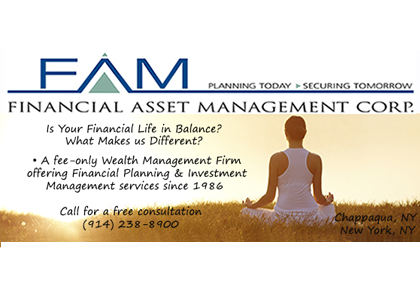Scott Kahan: How do you say the R-Word?

Talking China, underweight portfolios and the R-word with Certified Financial Planner Scott Kahan
The economic news this year has been dominated by the back and forth of the China trade war, debate about Federal Reserve interest rate policies, and questions about a new recession. For the average investor it has been dizzying. We sat down with Certified Financial Planner and President of Chappaqua’s Financial Asset Management Corp., Scott Kahan to sort it all out. Here’s what he had to say:
Scott Kahan: How do you say the R-word?
 Talk of recession is obviously on the rise. And there’s two things to remember about recessions. One is that they are inevitable. The other is that they’re impossible to predict.
Talk of recession is obviously on the rise. And there’s two things to remember about recessions. One is that they are inevitable. The other is that they’re impossible to predict.
Let’s try to focus on the state of the economy. We continue to be in a slow growth environment, as we have been for ten years. We had a couple of years of faster growth due to the sugar high of the Trump tax cuts. And now it’s back to 2%.
What about jobs?
Employment numbers remain strong. The jobs market is continuing to grow though the growth is slowing. The next leg to look at is manufacturing and home sales which will go down as the jobs market decelerates. On the other hand, consumer spending has been strong due to wage gains. So, it’s red-light, green light. Which gets us back to 2%.
Which brings us back to China.
And how has the Trade War impacted economic growth? I’ve seen economists suggest that it has shaved 3/10ths of a point off GDP growth. Others say half a point. What we do know is that tariffs raise the cost of goods to consumers. Economic uncertainty impacts capital spending. Companies are unsure where to invest. Supply chains are upset. Markets hate uncertainty.

Economists like to say that recessions make the economy more efficient. After the so-called Great Recession, we were set up for years of growth – which is what we’ve seen. Tariffs, on the other hand, decrease efficiency. No matter how you look at it – Trump is stepping on the toes of his own economy. Which is why we’re all dancing around the R-word.
And that’s the rationale for cutting interest rates.
That’s part of it. The market likes calling it an “insurance” cut against a potential recession. The bigger concern is what tools will the government have to fight a recession, whenever it may come?
What does this mean for the investor?
The market has seen gains this year. But over the past 12 months it has been flat. What we’re experiencing is increased volatility. People get scared by volatility. I have clients who say, “we’re headed into a recession. Why should I invest any new money?”
If you think you may need those investable funds in the next 24 months, you shouldn’t be investing it. You should put it in the money market. If you are already invested and you may need additional funds in a few years to pay for college, you should take risk off the table.
What about for the long-term investor?
If you are investing for long-term goals, such as retirement, you have to ignore the prognosticators. If your time horizon exceeds by many years not only the beginning but the end of the next recession you have to go back to your financial plan and look at your allocations.
Isn’t it time to cash in some of your gains?

If you have decided that your future financial needs are best served with a 60% equity allocation. And your stock gains have run your portfolio up to 70 or 75%. Then yes. You should sell some stocks and reallocate your portfolio to 60/40 – stocks and bonds. But the issue is not where the market is going, it’s where your portfolio is going. If you are over-weight stocks, then you should rebalance your portfolio. Just as you would at any time. But not because of market movements.
I get questions like, my plan is for 60% equity but with the market going down maybe I should take it down to 20%. If you have a crystal ball and you know when the market is going to tank and when it is going to rise again – fine. If not, don’t try to time the market. Because, maybe we get a deal with China and the market booms. If you are under-weight stocks you should not be selling equities.
Are any of your client’s underweight stocks now?
Yes. I get new clients all the time who are underweight stocks. This is one of the most common situations that motivate people to look for help from a financial planner. There are still people out there who sold during the crash and though they may have crept back in, are still not fully invested. For those clients we try to do a deep dive on why they are under-weight to figure out their risk profile.
 We’re not talking about 5% under-weight. We’re talking about 35%. When an investor is severely under-weight they have to get back in over a year or two. That’s a dollar cost averaging plan where you invest the same amount each month. Sometimes you buy into an updraft. Sometimes you get a sale. That’s investors average out their market purchases.
We’re not talking about 5% under-weight. We’re talking about 35%. When an investor is severely under-weight they have to get back in over a year or two. That’s a dollar cost averaging plan where you invest the same amount each month. Sometimes you buy into an updraft. Sometimes you get a sale. That’s investors average out their market purchases.
What’s the worst case of an under-weight portfolio you have seen?
There are people who need to add 50-60% equity to their portfolio. When I see this, I need to know how long has this money been out of the market? Situations like this require a deeper discussion with the client about risk profiles. And a look at purchasing power risk.
Because whether you have been avoiding the equity market for a long time. Or are looking to trade stocks on a short-term basis because of recession fears. Then you are just trading market risk for purchasing power risk.
Some people may have so much money they can afford to do this. But for most long-term investors, the purchasing power risk of an under-weight stock portfolio is greater than the market risk they are trying to avoid.
And that’s what you call talking the emotions out of investing…
That’s what it’s all about. And that’s what we try to do.
Financial Asset Management Corporation has provided fee-only financial planning and wealth management services for individuals and small businesses in the Tri-State area since 1986. They serve 150 clients and manage over 200 million dollars in assets. FAM Corp. President Scott Kahan is a Certified Financial Planner professional. (Financial Asset Management Corp., 26 South Greeley Avenue, Chappaqua, NY, (914) 238-8900; www.famcorporation.com )
More from Scott Kahan here:

















